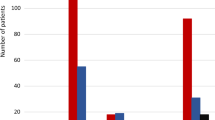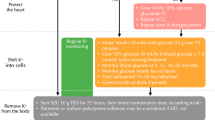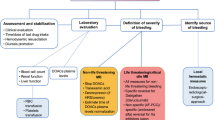Abstract
Background Antihypertensive medications are commonly used for a wide range of indications, yet it is unknown to what extent older adults are at risk of adverse drug reactions (ADRs) associated with their antihypertensive medication use. Objective The aim of this study was to determine the prevalence and characteristics of antihypertensive-related ADRs on hospital admission. Setting Metropolitan teaching hospital in Sydney, Australia. Method A retrospective cross-sectional audit of 503 older patients (≥ 65 years) admitted to hospital was conducted. Potential ADRS were identified from the medical record. Two independent clinical pharmacists reviewed each potential ADR using validated tools for causality, severity, preventability and contribution to hospitalization. Characteristics associated with an increased ADR risk among antihypertensive users were identified via logistic regression. Main outcome measure Antihypertensive related ADRs. Results Antihypertensives were used on admission by 68% of the cohort and the prevalence of ‘definite/probable’ antihypertensive-related ADRs among antihypertensive users was 16.4%. Antihypertensive medications were associated with a threefold ADR risk (OR = 3.09, 95% CI 1.85–5.16). Angiotensin II Receptor Blockers (ARB), impaired renal function, recent medication changes and previous history of allergy or ADR were all associated with an increased risk of experiencing an ADR. Conclusions ADRS associated with antihypertensive medicines were relatively common among older adults admitted to hospital. Increased awareness of those older persons who are most at risk of experiencing an antihypertensive-related ADR in the clinical setting may lead to early detection and minimization of ADR associated harms.
Similar content being viewed by others
References
Howard RL, Avery AJ, Slavenburg S, Royal S, Pipe G, Lucassen P, et al. Which drugs cause preventable admissions to hospital? A systematic review. Br J Clin Pharmacol. 2007;63(2):136–47.
World Health Organization. International drug monitoring: the role of the hospital. Geneva1972 Contract No.: 4251996.
Kongkaew C, Noyce PR, Ashcroft DM. Hospital admissions associated with adverse drug reactions: a systematic review of prospective observational studies. Ann Pharmacother. 2008;42(7):1017–25.
Onder G, Pedone C, Landi F, Cesari M, Della Vedova C, Bernabei R, et al. Adverse drug reactions as cause of hospital admissions: results from the Italian Group of Pharmacoepidemiology in the Elderly (GIFA). J Am Geriatr Soc. 2002;50(12):1962–8.
Leendertse AJ, Visser D, Egberts AC, van den Bemt PM. The relationship between study characteristics and the prevalence of medication-related hospitalizations: a literature review and novel analysis. Drug Saf. 2010;33(3):233–44.
Alhawassi TM, Krass I, Bajorek BV, Pont LG. A systematic review of the prevalence and risk factors for adverse drug reactions in the elderly in the acute care setting. Clin Interv Aging. 2014;9:2079–86.
Parameswaran Nair N, Chalmers L, Bereznicki BJ, Curtain C, Peterson GM, Connolly M, et al. Adverse drug reaction-related hospitalizations in elderly Australians: a prospective cross-sectional study in two tasmanian hospitals. Drug Saf. 2017. https://doi.org/10.1007/s40264-017-0528-z.
Craftman AG, Johnell K, Fastbom J, Westerbotn M, von Strauss E. Time trends in 20 years of medication use in older adults: findings from three elderly cohorts in Stockholm, Sweden. Arch Gerontol Geriatr. 2016;63:28–35.
Morgan TK, Williamson M, Pirotta M, Stewart K, Myers SP, Barnes J. A national census of medicines use: a 24-hour snapshot of Australians aged 50 years and older. Med J Aust. 2012;196(1):50–3.
Butt TF, Branch RL, Beesley L, Martin U. Managing hypertension in the very elderly: effect of adverse drug reactions (ADRs) on achieving targets. J Hum Hypertens. 2010;24(8):514–8.
Parameswaran Nair N, Chalmers L, Connolly M, Bereznicki BJ, Peterson GM, Curtain C, et al. Prediction of hospitalization due to adverse drug reactions in elderly community-dwelling patients (the PADR-EC Score). PLoS ONE. 2016;11(10):e0165757.
Ruiz B, Garcia M, Aguirre U, Aguirre C. Factors predicting hospital readmissions related to adverse drug reactions. Eur J Clin Pharmacol. 2008;64(7):715–22.
National Heart Foundation of Australia (National Blood Pressure and Vascular Disease Advisory Committee). Guide to management of hypertension 2008. Updated December 2010. 2008.
World Health Organization. The anatomical therapeutic chemical classification system with defined daily doses (ATC/DDD). World Health Organization. 2016. Available from: http://www.who.int/classifications/atcddd/en/. Accessed 22 Oct 2016.
Charlson ME, Pompei P, Ales KL, MacKenzie CR. A new method of classifying prognostic comorbidity in longitudinal studies: development and validation. J Chronic Dis. 1987;40(5):373–83.
Rockwood K, Stadnyk K, MacKnight C, McDowell I, Hebert R, Hogan DB. A brief clinical instrument to classify frailty in elderly people. Lancet. 1999;353(9148):205–6.
Forster AJ, Worthington JR, Hawken S, Bourke M, Rubens F, Shojania K, et al. Using prospective clinical surveillance to identify adverse events in hospital. BMJ Qual Saf. 2011;20(9):756–63.
Naranjo CA, Busto U, Sellers EM, Sandor P, Ruiz I, Roberts EA, et al. A method for estimating the probability of adverse drug reactions. Clin Pharmacol Ther. 1981;30(2):239–45.
Hallas J, Harvald B, Gram LF, Grodum E, Brosen K, Haghfelt T, et al. Drug related hospital admissions: the role of definitions and intensity of data collection, and the possibility of prevention. J Intern Med. 1990;228(2):83–90.
AMH (online). Adelaide: Australian medicines handbook Pty Ltd. 2017. https://amhonline.amh.net.au/. Accessed 3 May 2017.
Pont L, Alhawassi T. Challenges in the management of hypertension in older populations. Adv Exp Med Biol. 2017;956:167–80.
Hofer-Dueckelmann C, Prinz E, Beindl W, Szymanski J, Fellhofer G, Pichler M, et al. Adverse drug reactions (ADRs) associated with hospital admissions—elderly female patients are at highest risk. Int J Clin Pharmacol Ther. 2011;49(10):577–86.
Hellden A, Bergman U, von Euler M, Hentschke M, Odar-Cederlof I, Ohlen G. Adverse drug reactions and impaired renal function in elderly patients admitted to the emergency department: a retrospective study. Drugs Aging. 2009;26(7):595–606.
Alhawassi TM, Krass I, Pont LG. Hypertension in older persons: a systematic review of national and international treatment guidelines. J Clin Hypertens (Greenwich). 2015;17(6):486–92.
Klopotowska JE, Wierenga PC, Smorenburg SM, Stuijt CC, Arisz L, Kuks PF, et al. Recognition of adverse drug events in older hospitalized medical patients. Eur J Clin Pharmacol. 2013;69(1):75–85.
Du W, Lehr VT, Lieh-Lai M, Koo W, Ward RM, Rieder MJ, et al. An algorithm to detect adverse drug reactions in the neonatal intensive care unit. J Clin Pharmacol. 2013;53(1):87–95.
Karpov A, Parcero C, Mok CP, Panditha C, Yu E, Dempster L, et al. Performance of trigger tools in identifying adverse drug events in emergency department patients: a validation study. Br J Clin Pharmacol. 2016;82(4):1048–57.
Funding
T. Alhawassi was supported by an unrestricted scholarship from King Saud University, Saudi Arabia.
Author information
Authors and Affiliations
Corresponding author
Ethics declarations
Conflicts of interest
All authors declare that they have no conflicts of interest.
Electronic supplementary material
Below is the link to the electronic supplementary material.
Rights and permissions
About this article
Cite this article
Alhawassi, T.M., Krass, I. & Pont, L.G. Antihypertensive-related adverse drug reactions among older hospitalized adults. Int J Clin Pharm 40, 428–435 (2018). https://doi.org/10.1007/s11096-017-0583-7
Received:
Accepted:
Published:
Issue Date:
DOI: https://doi.org/10.1007/s11096-017-0583-7




